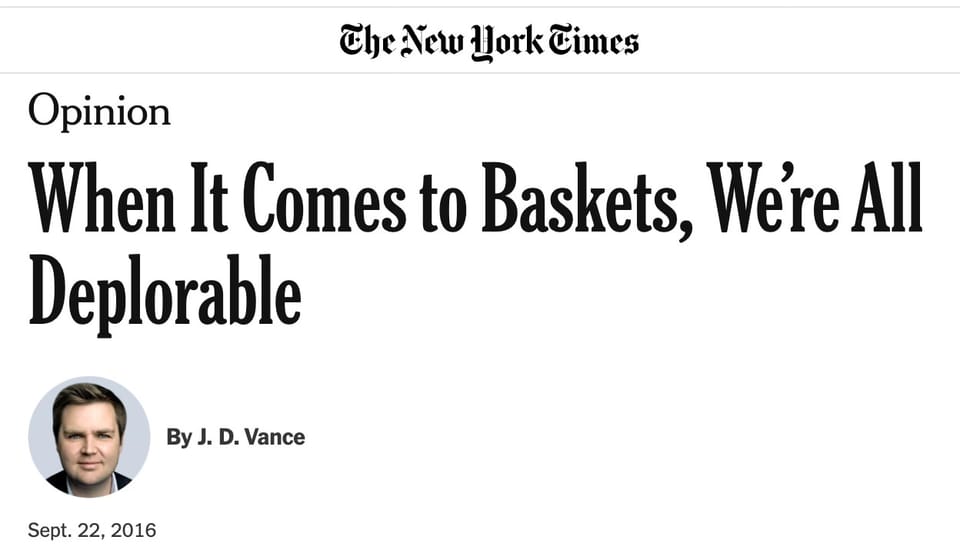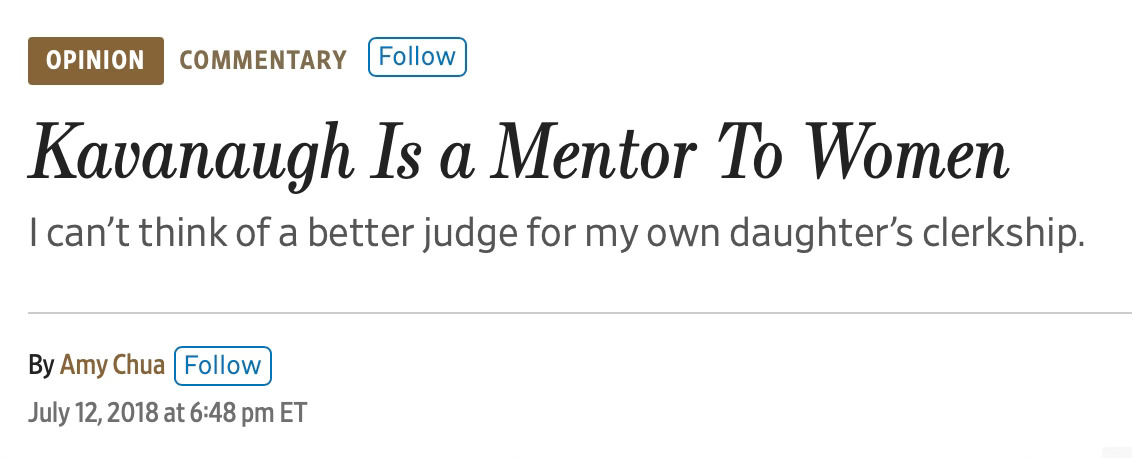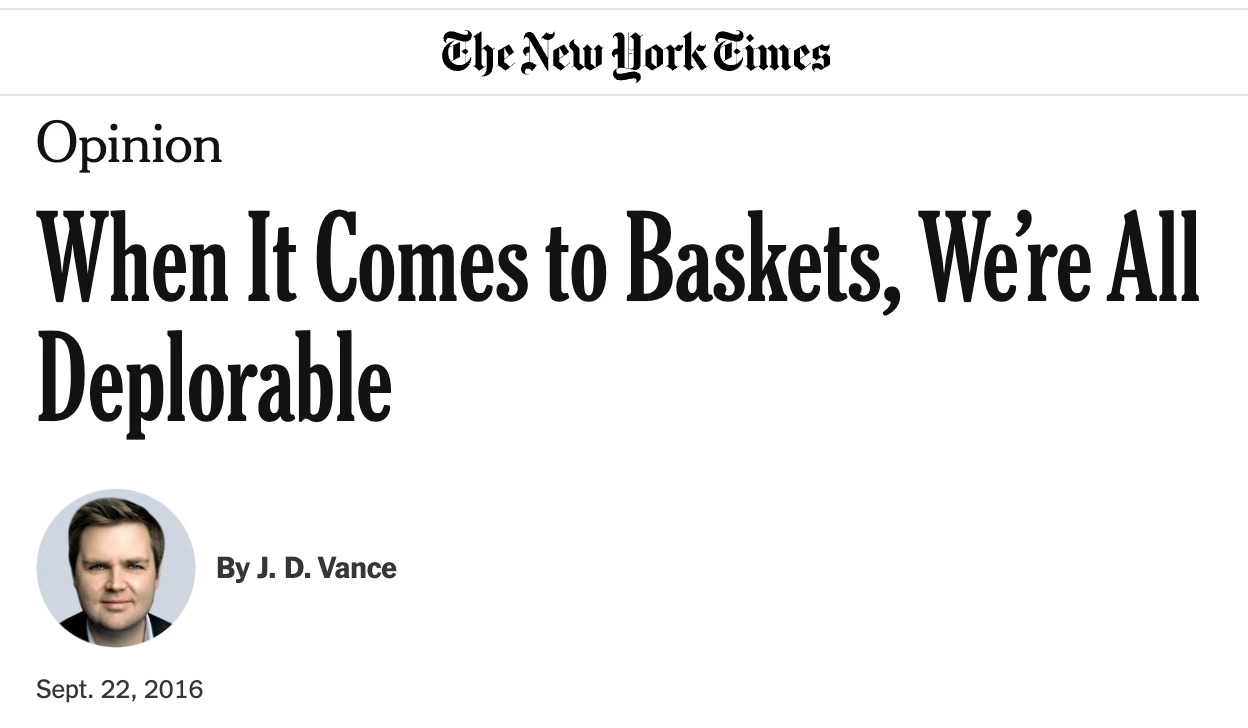None of us should even know who JD Vance is

JD Vance is a man completely lacking in merit.
Most of us can see this quite clearly. We can see it in his racist lies designed to divide Americans and incite violence against immigrants. We can see it in his creepy and controlling comments about women (Rape is “inconvenient” and people who do not have children are “sociopathic” and “less mentally stable,” according to JD Vance.) We can see it in his gossamer-thin resume: If Vance’s experience in elected office was a child, we would still measure its age in months, not years. Even Sarah Palin, previously the gold standard in under-qualified vice presidential candidates1 served in office considerably longer than Vance has.2 And Vance’s tenure isn’t merely short: It is pretty much completely without accomplishment — unless you consider Vance inspiring bomb threats against his own constituents’ schools an accomplishment.
Even Donald Trump doesn’t seem to think JD Vance is ready to be president:
Trump’s answer to the question: “When you look at J.D. Vance, is he ready on day one?” is telling. Rather than standing by his running mate, he avoided the question, by instead focusing on Vance’s electoral impact: “Historically, the vice president, in terms of the election, does not have any impact, virtually no impact.” Setting this claim aside, Trump’s unwillingness to address the question of Vance’s qualifications head-on suggests that, in choosing Vance, he had not taken seriously the most important consideration any nominee must entertain when evaluating vice-presidential candidates: is this person, who would be a heartbeat away from the presidency, qualified and competent to be president, if necessary?
So why have any of us even heard of this Heartland Hitler? Why is JD Vance, less then two months after his 40th birthday and with only a couple of years’ experience as a corporate lawyer and a few more as a venture capitalist, perhaps only a few months away from being a heartbeat away from the presidency? Because elites in academia, the news media, entertainment, and the tech industry have promoted him like no other candidate in memory — except, perhaps, Trump himself.
JD Vance is not a “product” of America’s elite institutions so much as he is a creation of them.
At Yale Law School, Vance was an unremarkable student. “He was not among the most engaged students,” according to a New York Times article about Vance’s time at Yale. “He didn’t distinguish himself in any particular way in my view,” added a professor for whom Vance worked as research assistant. The Times paraphrased another Yale professor Amy Chua noting Vance “lacked the intense interest in law exhibited by some students.”
Chua, a professor with better PR instincts than judgement, was known for funneling students to Brett Kavanaugh for clerkships when he served as a circuit court judge — and for telling women applying for Kavanaugh clerkships that “it was ‘not an accident’ that Kavanaugh’s female law clerks all ‘looked like models.’” Chua didn’t intend that as a warning — it was advice. According to The Guardian, Chua “was known for instructing female law students who were preparing for interviews with Kavanaugh on ways they could dress to exude a ‘model-like’ femininity to help them win a post in Kavanaugh’s chambers.” When Donald Trump nominated Kavanaugh for a seat on the Supreme Court, Chua endorsed Kavanaugh as a “mentor to women.”

Despite what she saw as Vance’s lack of interest in the law, Chua took him on as her protégé, and almost single-handedly turned him into a bestselling author: Chua talked Vance into writing a memoir, introduced him to her agent, wrote a blurb for the back cover of his book, and “probably emailed every single television producer and personality in the United States of America” to promote the book, according to Vance. (Chua: “It’s true, I emailed everybody. They were these creepy emails to people like Tom Brokaw.”)
Almost single-handedly.
The common myth of JD Vance is that after Hillbilly Elegy’s3 publication a nation eager to understand Donald Trump’s 2016 latched onto the book as a prescient and insightful exploration of the Americans who would cast their votes for him, turning Vance into a media sensation. But that isn’t quite how it happened.
In early 2016, Vance’s Hillbilly Elegy had not yet been published and approximately zero people had ever heard of him — but The New York Times began making him a star anyway. In February 2016, Times columnist Ross Douthat promoted a piece Vance wrote for National Review. In April, the Times published a Vance op-ed. (“Mr. Trump is unfit for our nation’s highest office,” Vance noted after indulging a lengthy bit of self-mythologizing about his own “Mamaw.”) Just two months later, the Times published another Vance op-ed, though the book whose sales supposedly made him famous still had not yet been published.4 Three days later, Times columnist David Brooks got in on the action, devoting a column to promoting Hillbilly Elegy on the day of its publication. In August, the Times ran pieces promoting Vance and his book on the 2nd, the 5th, a rave review on the 10th, and then featured Vance as the guest on its podcast on the 19th.
The Times’ treatment of Vance as it launched his book was uniformly glowing, exemplified by this command from the paper’s review of Hillbilly Elegy: “Whether you agree with Mr. Vance or not, you must admire him.” (Nah.) The puffery didn’t stop there: the Times’ Michael Barbaro declared Vance “a man who may be better qualified than anyone” to explain who Trump supporters are. Barbaro’s entire premise — that Trump supporters were an economically and culturally disadvantaged “white underclass” — was wrong. Five months prior to Barbaro’s piece, Nate Silver debunked “The Mythology Of Trump’s ‘Working Class’ Support,” noting “As compared with most Americans, Trump’s voters are better off.”5 But even if Barbaro’s cartoon caricature of Trump’s supporters was accurate, the idea that some random venture capitalist was “better qualified than anyone” to explain them would have been absurd.
By September 2016, the New York Times made it official, adding Vance as a “contributing opinion writer”; his first piece in that role an attack on Hillary Clinton over her reference to some Trump supporters as “deplorable.”6 By March of 2017, Vance was using the platform — and fame — the Times had given him to tout his move back to Ohio as a selfless act of public service, virtue-signaling his intention to found an organization “to combat Ohio’s opioid epidemic.”7
Yale’s Amy Chua and the New York Times had by then made Vance so famous that in April of 2017 Ron Howard decided to turn Hillbilly Elegy into a movie.8

That’s why we know who JD Vance is: Elites in academia, the news media, and the entertainment industry hand-picked him, trained him, promoted him, and handed him the most coveted platform in all of journalism. They made him a star before almost anybody had ever heard of his book. (Which, by the way, was trash.)
JD Vance is famous in large part because The New York Times absolutely adores promoting fresh-faced white male conservatives who halfheartedly and unconvincingly conceal their racism. If you’ve never done anything of note but can dress your contempt for people of color up with a thesaurus, there’s a pretty good chance the New York Times will treat you like an Important New Public Intellectual. There’s an endless parade of these guys — Richard Hanania, Nate Hochman — plucked from obscurity by the Times, promoted and platformed and published … and then to nobody’s surprise they turn out to be white supremacists. At some point, one is tempted to draw conclusions about the New York Times!
Elites of academia, the news media, and the entertainment industry made Vance famous, but they didn’t bring him to the precipice of real, unaccountable power. For that Vance needed the benevolence of some of the most powerful and reprehensible people in the tech industry:9
In the weeks before former president Donald Trump announced his vice-presidential pick, some of tech’s biggest names launched a quiet campaign to push for one of their own: Ohio Sen. JD Vance.
The former president fielded repeated calls from tech entrepreneur David Sacks, Palantir adviser Jacob Helberg and billionaire venture capitalist Peter Thiel, Vance’s former employer and mentor, imploring him to add the onetime Silicon Valley investor to the ticket […]
For Thiel, Vance’s presence on the Republican ticket is the payoff on a prescient bet placed a decade ago, when he embraced the Yale Law School graduate with Rust Belt roots as his protégé — joining a roster that included Meta CEO Mark Zuckerberg and OpenAI founder Sam Altman. […]
Thiel made him wealthy, setting him up to invest in companies that became popular with the MAGA set. He shepherded Vance’s entry into politics, bankrolling, alongside other Silicon Valley donors, his successful bid for the U.S. Senate in 2022.
“For Peter,” said one of the people familiar with his thinking, “Vance is a generational bet.”
Why is it important to understand how Vance happened? Because the guy is a deeply racist and sexist autocrat on the cusp of power — and he got here in large part because some of the most powerful and influential people in academia, news media, entertainment, and tech saw something in him they were desperate to promote. Merit didn’t have anything to do with it; he hadn’t ever really accomplished anything. They just liked him.
That’s likely to affect how these industries react to tonight’s vice presidential debate. Only a fool would bet against Elon Musk’s Twitter promoting praise for Vance’s performance. Vance is all but certain to unleash a flood of disingenuous, faux-intellectual bullshit tonight — but will the news media that fell so in love with him eight years ago call him on it, or will they again bestow upon him undeserved plaudits?
The Pyrite standard? ↩
As Hayes Brown notes, only 39 percent of Americans thought Palin was ready to serve as president — and that’s fully 10 percentage points higher than the 29 percent who said Vance was ready to serve as president in a July poll. ↩
Vance grew up in Middletown, Ohio, just outside Cincinnati — not, as the Vance’s self-mythologizing suggests, in rural Appalachia. ↩
In that op-ed, Vance wrote: “Mr. Trump, like too much of the church, offers little more than an excuse to project complex problems onto simple villains.” Ahem. ↩
Many others have done so as well. I mention Silver because the Times cannot have been unaware of Silver’s piece: He’s quite famous! ↩
Clinton’s assessment has aged considerably better than Vance’s pretend discomfort with the overt racists he now aligns himself with. ↩
Vance’s organization folded by 2021 and “left only the faintest mark on the state it had been meant to change, leaving behind a pair of op-eds and two tweets” — but not before it funneled money to a political consultant who also advised Vance as he considered a Senate campaign, as well as an assistant who schedule Vance’s political speeches, leading organization employees to conclude that the whole thing was nothing more than a vehicle for Vance’s political aspirations. ↩
Metacritic score: 38 out of 100. Rotten Tomatoes: 24% ↩
I don’t have time to get into a whole Peter Thiel thing in this space, so I’ll just offer you this:
Thiel and Sacks met at Stanford, where they worked together on the Thiel-founded Stanford Review. In 1992, the Review published “The Rape Issue,” which included a piece by Sacks defending a student who had pleaded no contest to statutory rape. Sacks considered the crime “a moral directive left on the books by presexual revolution crustaceans.” According to Thiel biographer Max Chafkin, “Sacks included a graphic description of the encounter, noting that the 17-year-old victim ‘still had the physical coordination to perform oral sex,’ and ‘presumably could have uttered the word, ‘no.’”
[…]
In 1995, they published a book called The Diversity Myth: Multiculturalism and Political Intolerance on Campus. Angry, trollish, homophobic, fixated on identity and campus politics, The Diversity Myth could easily be produced today, with panic about “woke” culture substituting for every mention of multiculturalism, which is wielded throughout as a bitter epithet. In the book, Sacks and Thiel revisited the Stanford rape, writing that “a multicultural rape charge may indicate nothing more than belated regret.” (In the authors’ moral universe, almost anything can be derisively labeled as “multicultural.”) ↩
Member discussion